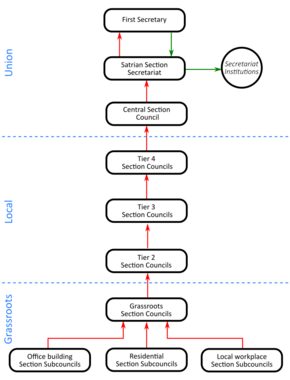Satrian Section of the Workers' International
Satrian Section of the Workers' International Name in national languages
| |||
|---|---|---|---|
 | |||
| Abbreviation | SSWI (official) | ||
| First Secretary | Abhijit Kamalanayan | ||
| Presidium | Secretariat of the Satrian Section of the Workers' International | ||
| Founder | Sheru Ramprasad | ||
| Founded |
| ||
| Split from | Satrian Section of the Workers' International | ||
| Headquarters | Nadipatnam | ||
| Newspaper | Dawn | ||
| Youth wing | League of Youth of the Revolution | ||
| Labour wing | Federation of Labour Organisations | ||
| Armed wing | Army of the Socialist Revolution | ||
| Media wing | Arthasthan Media | ||
| Ideology | |||
| Political position | Left-wing Factions: Centre-left to far-left | ||
| International affiliation | Congress of the Workers' International | ||
| Slogan | Serve the People | ||
| Anthem | Keep Stepping, Stepping Forward | ||
| Party flag | |||
The Satrian Section of the Workers' International (SSWI), commonly known as the Satrian Section, is a is an umbrella group of socialist organisations centered in Arthasthan, although it has branches across Satria. The Section claims to be the legitimate Section for Satria rather than its Ajahadyan counterpart. The SSWI's claim is recognized by the Congress of the Workers' International and the Association for International Socialism.
The SSWI originates from a 1934 split in the original Satrian Section of the Workers' International between the Ajahadyan and Arthani factions. Led by Sheru Ramprasad, the Section was one of the main forces behind the anti-colonial movement in Satria. At the onset of the Solarian War, forces allied with the Section known as the National Liberation Army, fought against Etruria forces. The Satrian Section declared the formation of the Satrian Commandery in 1944, but it wouldn't until after the Coian Evacuation that it achieved de jure independence. The Section would rule the Commandery until its reorganisation into the United Socialist Republics of Arthasthan in 1967. The Section integrated itself into the structure of the new government, and gradually subsumed many of its functions. Today the Section functions as part of the federal government and as the primary political forum for its member organisations.
The SSWI is described by the Arthani government as "the political base of people's power" as it operates through mass participation and popular mobilisation. It has a significant role in society by promoting national unity and ethnic and religious harmony. The Section revolves around a hierarchical system of councils from the local level to the federal level, collectively known as the Pyramid, which are organized on the basis of councilism where each council elects the next-highest council. In addition, the Section's member organisations play a major role in the Section by conducting the Section's programs and policies. Representatives from its state councils elect the Union Section Council which determines policy and elects officials. The Union Section Council elects the Secretariat which administrates the Section. The Secretariat is led by the First Secretary, who is the leader of the Section and organises the Section's administration.
The Section is committed to socialism and continues to participate in the Congress of the Workers' International. According to the Section's constitution, the SSWI follows the Ramprasad Thought, which combines Arthani culture, councilism, left-wing nationalism, and market based ideals into an ideology that the Section claims can guide the country to socialism. It importantly claims that Arthasthan has not yet achieved socialism and is in the process of building the basis for a future socialist system.
Name
In all official documentation and media produced by the party, it refers to itself as simply as the Satrian Section as it views itself as the legitimate Section of the Workers' International for the subcontinent. It also refers to itself as the People's Movement. The party officially refers to the Ajahadyan Satrian Section as simply "Revisionists" as a play on their name. To differentiate it from from the Ajahadyan Satrian Section, international media commonly refer to the party as the Arthani Satrian Section after its power base in Arthasthan or the Ramprasadist Satrian Section after the party's official ideological line.
History
Ideology
Organisation
The organisational structure of the Section is based upon councilist principles like other Sections of the Workers' International. The Section is organized in a hierarchical and pyramidal system of councils, known as the Pyramid (Pirmiḍ), where a council elects the members of a council the next tier up, who then elects the next tier. Under the councilist system, the Section ultimately derives its political power from these councils. It is designed to ensure that all tiers of the Satrian Section, from its local councils to the national council, is ultimately accountable to its grassroots party membership. In general, Section Councils consist around a hundred members and operate by consensus and governed by collective leadership.
Section Councils
The lowest level of the Satrian Section are its Grassroots Section Councils (GSCs), which are directly controlled by the party's grassroots membership. The Councils function as a open political forum where the Section's members participate by direct democracy and consensus decision-making. These section councils consist of an average of a hundred members from local subcouncils. The type of subcouncils vary across the country, but the most common ones are subcouncils of blue collar workplaces, subcouncils of white collar workplaces, and subcouncils of residential complexes. These councils collectively serve to ensure that the Satrian Section is tied to its grassroots and that the party can exert its influence at the local level.
Each Grassroots Section Council (GSC) would send a delegate to a higher level Section Council consisting of around a hundred delegates representing GSCs in the geographical region. It consists of members from various subcouncils that operate in government institutions, organisations, and businesses at the council's tier. The second level council would send a delegate to a third level council, consisting of delegates from second level councils. The third level councils send delegates to the highest tier at the fourth level. A delegate from a lower level council would be bound to communicate the views of the council that sent them, but would be free to vote as they wish. However a delegate can be recalled at any time by their sending council. Rotation of delegates are mandatory, and delegates would be required to return to their sending councils frequently. These Section Councils serve to determine party policy through consensus at their tier and report news and other information to a higher tier.
The highest tier of the Satrian Section in Arthasthan consists of the Union Section Council, which functions as the organisation's legislative body, and the Secretariat, which functions as the Section's highest organisational and administrative body. The Secretariat is oversees other party institutions such as the Section Congress, the Political and Legal Affairs Commission, and the Central Military Commission.
According to the SSWI's constitution the Union Section Council (USC) is the highest deliberative and decision-making body of the party and functions as its de facto party conference and legislative body. The Council consists of around 50 representatives elected by Arthasthan's Tier Three Councils and 7 representatives from the Satrian Section's international branches. The USC is the top forum for national debate and decision-making about policy direction and issues that effects the entire Satrian Section. The USC examines reports sent by its councils and international branches to inform itself about issues effecting the party and to inform policy decisions and debate. Its last major role is to elect the members of the Secretariat and to approve further appointments made by them.
Secretariat
The Satrian Section Secretariat is the Section's executive body that serves as the collective head of the organisation. The Secretariat has an important role in setting the agenda of the Section's national institutions and the implementation of the decisions of these bodies. The USC consists of nine elected officials and various appointed officials, led by the First Secretary. The body functions as a cabinet, with its members tasked with overseeing certain aspects of the organisation. The Secretariat's main duties include the daily administration of the Satrian Section, the implementation of Section policy as decided by the USC, and appointment of officials in other party institutions. Although the Secretariat in theory is solely an administrative body, in reality it wields significant influence over the Satrian Section's institutions, and functions as the Section's leadership.
The First Secretary of the SSWI is the chairperson of the Secretariat and the head of the Satrian Section of the Workers' International. The Section's constitution establishes the position as the party's head administrator, commander in chief, and chief diplomat to Arthasthan and the world. The First Secretary's duties include overseeing the activities and duties of the Secretariat, attending sessions of Section institutions, commanding the party's armed wing the Army of the Socialist Revolution and other paramilitaries, and consulting with Arthansthan's civilian leaders. The First Secretary's power is broad, but in reality, power is shared with the Secretariat, which makes decisions by consensus.
Affiliated organisations
Cultural organisations
- • League of Youth of the Revolution
- • League of Women of the Revolution
- • Association of Honorary Retired Persons
Labor organisations
- Federation of Labour Organisations
- • All-Nation Federation of Labor Unions
- • All-Nation Service Workers' Union
- • Arthani Agriculture Organization
Political organisation
- Representatives of the Socialist Revolution
- • Arthani Subsection (Anti-Revisionist)
- • Arthani Subsection (Ramprasadist)
- • Arthani Subsection (Progressive)
- • Followers Congress
- • Arthani Movement to Socialism
- • Prosperity
Economic organisations
Armed groups
Religious organisations
- • Patriotic Truth Association
- • Council of Followers
International branches
![]() Ajahadya
Ajahadya
Ajahadyan Subsection (1946-1953) (banned)
People's Liberation Army (1975-1993) (banned)
Baekjeong
Vijayla Subsection (1946-1953) (banned)
The current Vijaylan Subsection of the Satrian Section of the Workers' International was reformed in Baekjeong in 1985 following a warming of relations between Baekjeong and Senrian-aligned Satrian states, chief among them Arthasthan. After the conclusion of the Third Satrian War, Baekjeong reclaimed its lands lost to Ajahadya in the Dakian War. This more than doubled the number of ethnic Satrians living in the country and posed a major security concern for Ogbei, given the intensity of the Satrian Insurgencies in decades past. Rather than continue the prior crackdowns and repression of Satrian culture, Baekjeong instead implemented a policy of reconciliation and mediation with its Satrian citizens. One of the earliest concessions granted was to allow the Satrian Section of the Workers' International to reform its Vijaylan branch as a political club and union.
The Eunyeon Compact of 1991 reaffirmed the right of the SSWI and its Subsection to exist as a unique ethnic union that represented workers of Vijayalan and Bumite heritage, the only union granted such a right. The first Subsection-affiliated assemblyman, Lee Sanjib, was elected in 1987. Following the 2004 elections, the Vijaylan Subsection was officially recognized as the ninth largest union in Baekjeong, allowing its registered members to elect seven assemblymen to union-reserved seats. As of the most recent 2019 elections, the SSWI has maintained its position as the ninth largest union, commanding seven union assemblymen, four directly elected assemblymen, and two provincial assemblymen for a total of thirteen seats out of four hundred in the Cheonrim Assembly. Membership has been on the rise, particularly in Western Bumayla, and it is predicted that in the next provincial election cycle, SSWI-VS-affiliated legislators will form a majority in two of the three local assemblies. Today the Vijaylan Subsection is the largest organisation affiliated with the Satrian Section outside of Arthasthan.
Gulbistan
Tobadad-Dakpesh Subsection (1946-1960) (banned)
![]() Padaratha
Padaratha
Padarathan Subsection (banned)
![]() Rajyaghar
Rajyaghar
Rajyani Subsection (banned)
